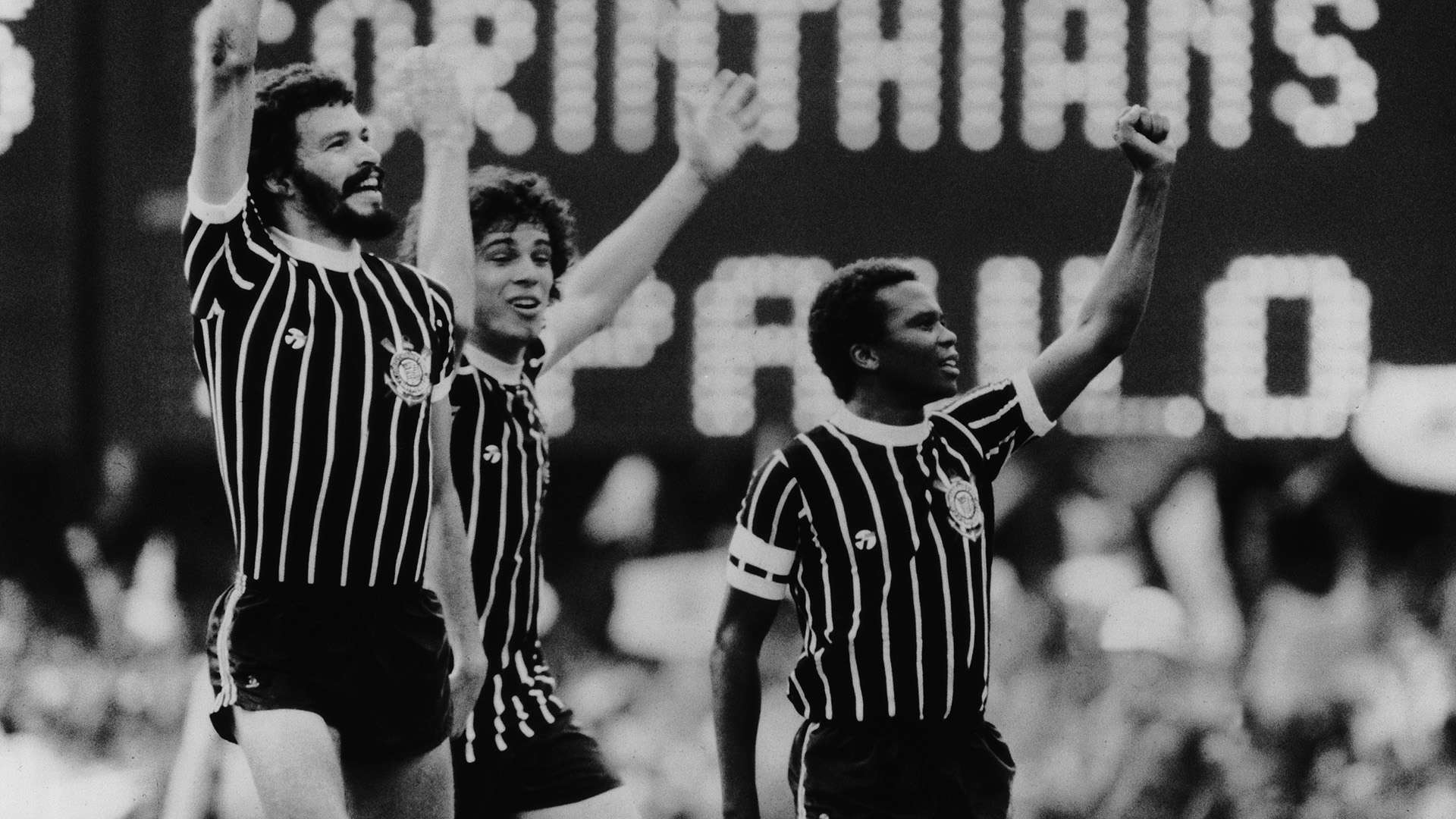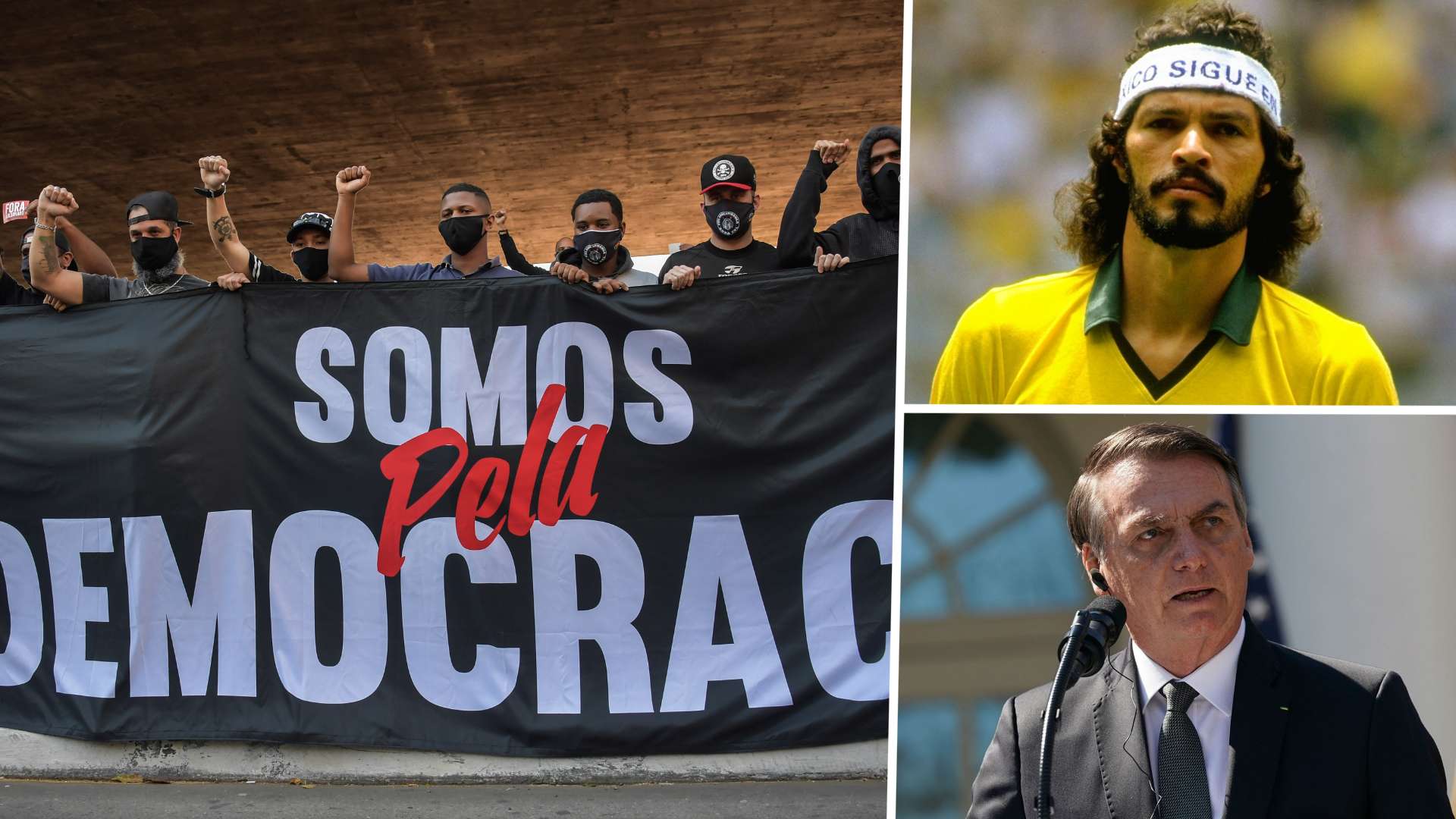Cornered by critics, enemies and former allies alike over his handling of the coronavirus pandemic, President of Brazil, Jair Bolsonaro, had been banking on the return of football to bolster his stuttering control over the South American country.
At the weekend the colours of some of the nation's top teams did indeed return to the streets. They were only there to condemn his erratic rule, however, as a series of charged protests that would have made Selecao legend Socrates proud took place.
Sunday afternoon saw part of Corinthians' organised supporters group, the Gavioes da Fiel, pack Sao Paulo's landmark Paulista Avenue alongside social pressure groups and anti-fascist organisations. “We are for democracy,” their banner read as they headed the protest.
Bolsonaro - who fired one health minister in April and saw their replacement resign after just a month in the role - has overseen growing panic within Brazil as confirmed Covid-19 cases recently passed the half-million mark and deaths surpassed 30,000. Experts believe that, in both instances, the true numbers are far greater.
Corinthians' progressive support was joined at the Sunday's march by contingents from their on-field rivals, Palmeiras' Anti-Fascist Collective also marched alongside additional representatives from both Santos and Sao Paulo. In Rio de Janeiro a group of Flamengo fans, under the banner of Democracia Rubro-Negro, made their voices heard. Further north in Belo Horizonte arch-enemies Atletico and Cruzeiro put aside their differences to march together.
Next Match
“We have noticed in the group that patience has run out,” Chico Malfitani, one of the founders of the Gavioes da Fiel, told reporters after the march in Sao Paulo, which ended in clashes between pro and anti-Bolsonaro protesters, who in turn came under fire from rubber bullet and tear gas-wielding security forces
“It is disgusting to hear the president talk about a 'little flu' and chloroquine," Malfitani continued. “Twelve [Corinthians] members are dead because of Covid-19... we can't resist this daily attack against democracy. Our plan now is to light the fuse. Throw the first match, since the opposition and popular movements are not going out.”
The irony of heading to the streets to denounce a president who, among other criticisms, has found himself in the firing line for refusing to endorse lockdown or social distancing measures, is not lost on Malfitani and other organisers.
Opponents to Bolsonaro's rul - including large numbers of state governors and city mayors - have largely respected scientific advice to close public areas and discourage people from leaving their homes. It is a move that may help to avoid total catastrophe in Brazil, but has also had the undesired effect of 'gifting' the public forum to the president's supporters.
Such groups, most notably an armed paramilitary sect called 'The 300', are pushing for Bolsonaro to dissolve Parliament and the Supreme Court. On Saturday, they marched through the country's capital, Brasilia, with masks and torches to repeat that plea, with figurehead Sara Giromini – who has adopted the surname 'Winter' in tribute to an ex-member of the British Union of Fascists – leading the way.
That provocative act prompted Sunday's response, with thousands of Brazilians demonstrating that the democracy that was recovered in 1985 after more than 20 years of military dictatorship is worth fighting for.
“Football fans are rarely political for the simple reason that there are a lot of them, and aside for their support for their club they rarely think alike on any one issue. But Corinthians fans are more political than most and they have a history of progressive action,” Andrew Downie, author of the biography Doctor Socrates , told Goal.
“They were among the first to protest against the dictatorship in the late 1970s and, of course, Democracia Corinthiana was so revolutionary that we are still talking about it today."
Four decades ago, Socrates fought for a similar cause. While Brazil buckled under the heel of General Joao Figueiredo, Socrates' Corinthians stood out as a faint beacon of democracy.
Almost every decision at the Sao Paulo club was put to a vote, from the day in which the Timao would travel to away games to new signings and coaches. “Our debates and votes were almost a vice,” Socrates once joked. “We would even vote on whether the bus would stop so someone could take a p*ss!”
At the same time as the Brazil legend and Corinthians colleagues Wladimir and Casagrande were lighting up the pitch on the way to back-to-back Paulista State Championships in 1982 and 83, they were also throwing their weight behind the nation's calls for the return of democracy. “The 15th – vote” was the legend sported on each player's shirt at the end of 1982, imploring citizens to participate in newly-convened governor elections in Sao Paulo.
One close ally of Socrates' was Steel Workers Union president – and lifelong Corinthians fan - Lula da Silva, who was jailed during the dictatorship for his activities before in 2003 being elected as President of Brazil while representing the left-wing Workers' Party. Together he and Socrates fought for the advent of democracy, including the cause which ultimately led to the midfielder's self-imposed exile from Brazil.
 Reprodução
Reprodução
“Socrates was one of the most vocal voices behind [The Diretos Ja] movement, which campaigned for a return of direct presidential elections. He spoke at one famous rally to more than a million people. It really captured the imagination,” Downie added. The campaign, however, was unsuccessful. Socrates, who had vowed to leave Brazil should the motion fail, had to keep his promise, moving to Fiorentina for his first and only taste of European football.
Without the charismatic, bohemian playmaker, Democracia Corinthiana began to flounder. It culminted in its defeat the following year when director of football Adilson Monteiro Alves, a sociologist who, alongside Socrates, had been fundamental in the club's brave new approach, lost his bid to become Corinthians president.
The name, however, remains synonymous with the Sao Paulo outfit, helping to immortalise above all the figure of their bearded midfield genius, who passed away in 2011.
The mere mention of politics and football in the same breath is enough to draw the ire of some observers, who profess their wish to keep the two separate.
But any activity that involves millions, if not billions, worldwide, boasts the gross domestic product of a medium-sized nation and brings together participants and supporters of all races, classes, background and sympathies simply cannot remain ignorant of the world around it. Be it Brazil's fans calling for democracy or Bundesliga stars such as Jadon Sancho and Weston McKennie protesting against the killing of George Floyd , the gestures are both timely and necessary.
"I dream of the day when a fan group like Gavioes da Fiel politicise, because they can truly can change and accelerate the political transformation of this country. When they are, (political) things will change and not just in football,” Socrates once said. There are signs, even if still faint, that such a movement may one day be possible.
The legend's brother Rai, himself an accomplished footballer and World Cup winner in 1994, is heavily involved in one such initiative, Juntos, which seeks to provide an alternative to Bolsonaro's perceived abuses and fights for “life, liberty and democracy".
“It's early to say why fans are uniting, or even if they really are uniting,” Downie concluded. “It's way too early to say if that day [of fan groups politicising] has come. But seeing them out there together is undoubtedly a change for the good.”


